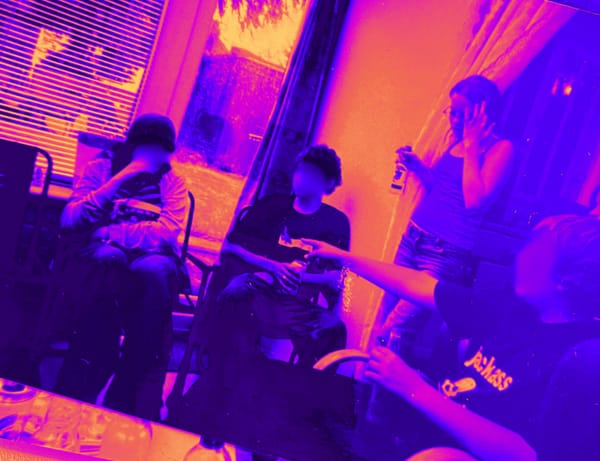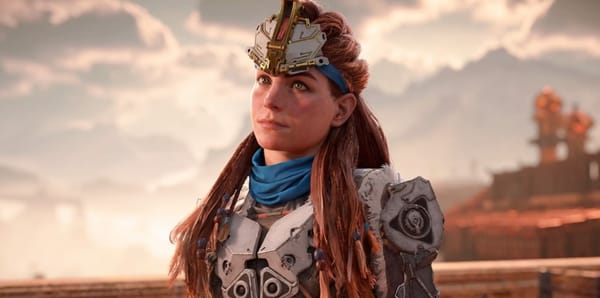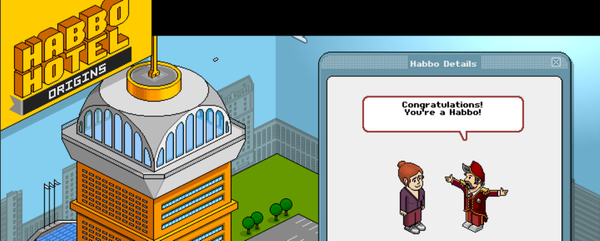What Am I Doing This For, Exactly
On Sudowrite, magic, and the human mind
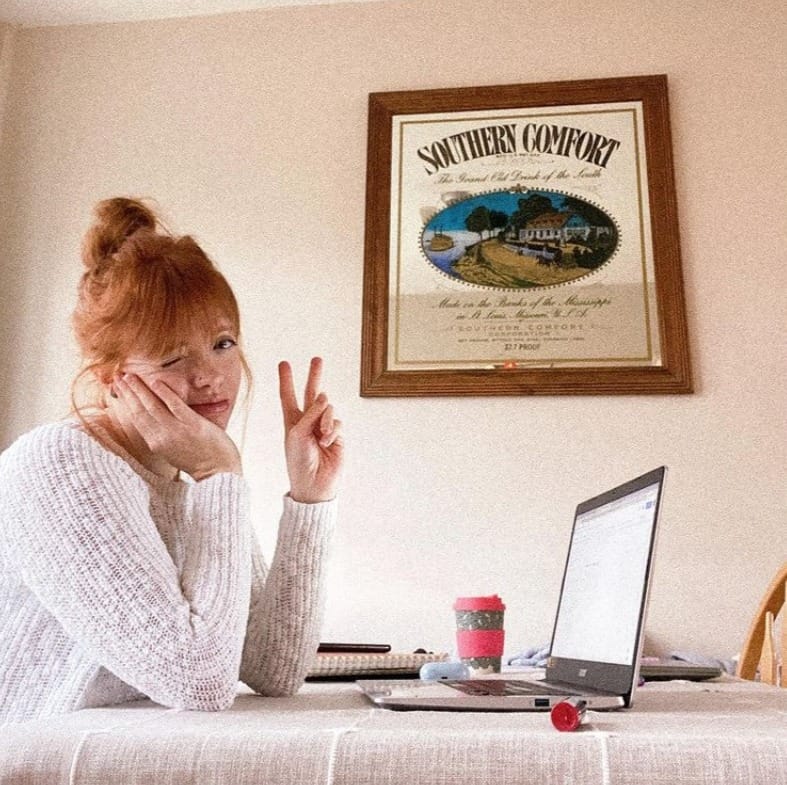
In case you missed it: a few days ago, the AI-assisted tool Sudowrite launched, much to the abject horror of creative writers everywhere. Sudowrite uses AI to flesh out plot points, come up with twists, even write chunks of prose in your own style. According to creator James Yu, it can 'really feel like you're mind melding with a machine in your novel.'
My Twitter has been ablaze with this. I need to exorcise it from my brain somehow, and so I wrote this. If you don't know what Sudowrite is, I'd definitely recommend reading into it first.
I have a lot of worries. I am just that sort of person. But there are worries, and then there are Big Ticket Worries. For me, these are climate change, the spread of misinformation, and the rise of AI. I share Tom Scott's feelings about AI: I don’t think it will cause the apocalypse, but I do think it’s important. It has the capacity to change things at such monumental speed and scale that we'll look back on it and have a kind of societal whiplash. Entire professions at risk, huge corporations becoming too powerful, blah blah blah. You get what I'm on about.
Generally, I try not to think about it too much. (Partly because I think there will have to be legislation put into place. Given that the current UK government can't even be arsed to pay to have literal human shit removed from our waters, I sincerely doubt they're going to want to pay for the unemployment benefits of hundreds of thousands of former receptionists, admin staff, PAs, programmers, and copywriters.) But mostly, I can't think about these things because I've only just dragged myself out of one pit of existential despair, and I can't afford to fall down another one.
What's really depressing is the fact that AI tech bros seem to be producing programs that are designed to do the jobs we actually want to do, rather than freeing us from the tedious bollocks we have to waste our time with in order to earn money and stay alive. And while the relationship between humanity and art is probably less of a worry than, say, someone like Putin using AI to create devastating weapons, it’s still worth talking about, I reckon.
Art was first; we watched as artists suffered the consequences of DALL-E-2 and others. It was inevitable that writing would be next. It was just a matter of time.
The crux of the issue is that we want to have everything, and we want it immediately without having to put any effort into it: Amazon deliveries, content, the respect of other human beings. We want it on tap. It's a kind of Veruca Salt mentality that I reckon is probably inherent in all humans to a degree, but some more than others. Why spend years and years honing your craft when you can stuff some prompts into a machine instead? All of the glory (debatable) and money (laughable) of being a writer, with none of the work.
Look. I'll be honest. I've read the stuff that Sudowrite is currently producing: it's not good. It clearly won't work in terms of writing whole novels. For me, the issue isn't that I think that Sudowrite is going to do everyone from E.L James to Kazuo Ishiguro out of a job overnight. Nor do I think that anyone who enjoys (or even creates) AI art should be digitally hung, drawn, and quartered, and have their lives ruined forever.
But I do have a problem with the principle of it.
Right now, it's shit, but it won't stay that way. It will get better, and it will become harder to detect what has been written by a human, and what has been written by a machine. AI will be able to produce longer and more complex writing. What upsets me - and surprised me more than it should have done - is to see other writers championing it, saying they've been using Sudowrite in their own work to uncover new plot points and churn out novels more quickly.
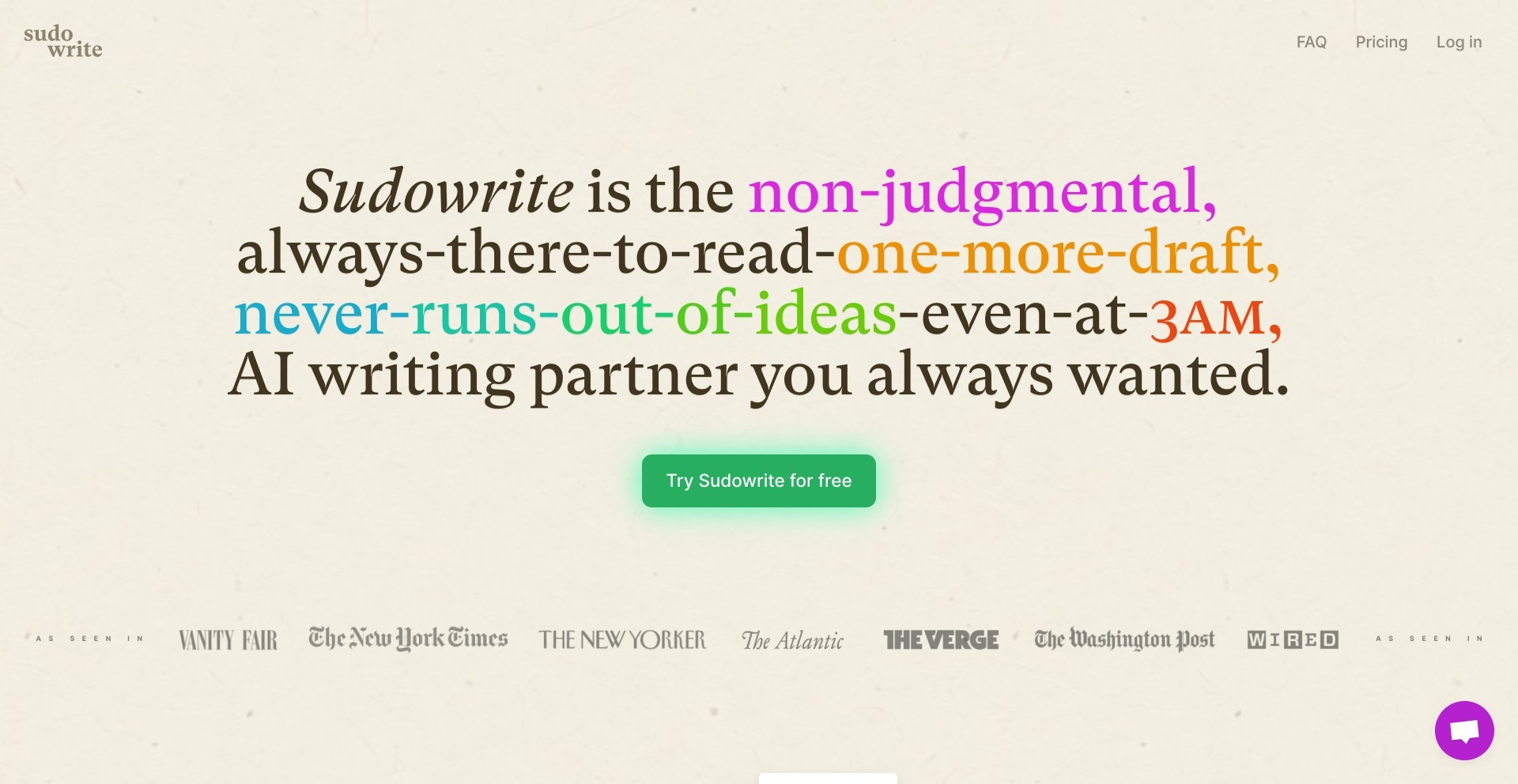
The aim of Sudowrite is apparently to make it easier for people to turn their ideas into stories. Apparently, according to Ryan Mather, the design lead on Sudowrite, their platform has helped one writer to overcome her writer's block, which she had been suffering with for years. He feels that they’re doing a good thing for humanity. (The fact that thousands of people have responded that tools like Sudowrite could make their lives much worse seems to have been completely lost on him.)
This is the first argument of AI enthusiasts: if you're anti-Sudowrite, you're gatekeeping. You're being elitist and unfair to people who don't find writing easy or fun. To which I say: absolutely not, nope. I'm working class. I grew up on a council estate, and at times, we really struggled for money. My husband and I rent our house and have no realistic prospects of property ownership, I can't drive, we can't afford to run two cars, and I'm only now, at the age of 34, halfway through doing a degree.
I know what it feels like to feel like the inferior one in a group. The literary world is full of well-educated, middle-class, wealthy people. It's daunting. Class, money, and education are barriers. They can be overcome, but they do exist. I didn't call myself a writer for years, even though I've been writing since the age of six. It felt like a title too lofty for me.
Generally, I don't like gatekeeping around the word 'writer'. I don't think you have to be published in anything to call yourself a writer, actually. I do, however, think you actually have to sit down and do the fucking writing.
Some people have suggested that there should be a new term for writing with AI. I agree with this. AI-assisted writing? Co-written with AI? Written by AI, edited by humans? There should be something. As a reader, I want to be able to make the choice to pass on certain writers if they’re selling books that have partly been generated for them. If people are morally opposed, they should at least have the option of saying no.
And, to be fair, if all the AI drew from was a kind of common resource library made up of works from people who have explicitly consented to it, I could see why reading an AI-written novel could be quite fun. Boring, maybe, and a bit janky, but interesting. But unfortunately, this isn’t the case.
The other key argument I've seen is that writers and artists are up in arms about this sort of thing because we just don't understand it. Some AI enthusiasts seem to think they've reached another level of enlightenment that is locked away from the plebs; we'll learn, and we'll all feel silly when we eventually do get it. And I kind of get this: I don’t think all AI is bad, but that doesn’t mean it’s all good, either. It’s not some kind of ridiculous battle of Tech Wizards vs. The Luddites.
Anyway. Writers using Sudowrite are still hanging onto the idea that it’s not actually plagiarism because it’s not copying and pasting other people’s work. Admittedly, Sudowrite's creation process is, at this stage, still slightly unclear. On their FAQ page, it states the following about plagiarism (and bear in mind, this is about to get quite tedious, but I think it's important):
'Paste in the first paragraph of Harry Potter, and Sudowrite will confidently output the second paragraph.'
Am I losing my mind here? Where is it getting this data from if it doesn't use other people's work without their permission, if it's not scraping the web somehow? If it hasn't read Harry Potter, how does it know what the second paragraph is? Magic?

Oh shit. Maybe it is.
Sudowrite states that it uses 'several variants of GPT-3'. The same GPT-3 that cannot exist without the millions of websites it scrapes from. Even Yu admits that 'if people were able to opt out at scale, then the models would become noticeably worse' (quoting from the excellent Wired article 'The Fanfic Sex Trope That Caught A Plundering AI Red Handed' by Rose Eveleth).
So essentially, Sudowrite works like ChatGPT. That means anything you put out onto the internet can potentially be used; as Sudowrite isn't declaring every website that their AI uses, there's no way of knowing. Book reviewers, Wikipedia article writers, fanfic writers, bloggers, Substack writers. It's potentially all up for grabs. And unless the creators come out and explicitly tell us that they don't use anything other than the data users specifically feed into the machine, we only have this to go on.
The fact that it doesn't 'copy and paste' text means nothing in this scenario. It's still using other people's work. If it didn't do that, it couldn't exist. Telling people they're not allowed to plagiarize means nothing if the entire platform runs on using other people's words. And there's no way of opting out; declaring that you don't want to have your work used by AI about as effective as those 'I DON'T GIVE PERMISSION FOR MY DATA TO BE USED AND THIS IS A LEGALLY BINDING CONTRACT' Facebook status updates your relatives post every now and then.
We get it, okay? We understand how it works, in the same way that artists understand how AI generators use their work without permission. We do get it. We just have a very different idea of right and wrong.
AI, in this present moment, is kind of reminiscent of the Wild West days of the internet when I was a kid. Nobody knows what to do with it or even if they should do anything about it. Governments don't even seem to understand how Facebook works yet, so at this rate, they'll probably cotton onto this being an issue in about fifteen years’ time. Meanwhile, we're all floundering, trying to figure out what to do as AI scrapes our work and regurgitates it while other people make a profit.
Where this will go legally is unknown, but the main thing that AI advocates appear to be gunning for is the idea that absolutely everything can be used by AI under the guise of 'fair use'. In practise, this means that anyone can mash in a bunch of words, generate art, and then print a book and make money from it. (Sadly.) The original art - without which the newly generated art wouldn't be able to exist - is not credited, and the original artists (you know, the ones with the actual skill and talent) are not compensated.
I hate calling out individuals like this, so believe me when I say this gives me no joy. Still, I have to bring up a salient point from a video entitled 'AI and the future of creative writing' in which the panel suggested that, thanks to AI, there will be a 'shrinkage in the market' for writers, but new jobs will be created 'because there will be this huge market of people producing their AI-written book who want someone to double-check it.' (Thanks to Twitter user Zinnia Z for digging this up).
This is the bottom line, really. AI enthusiasts don't seem to really grasp the fullness of what could be lost here. One job replaces another, right? Honestly, I'd rather quit altogether than have to earn a living proofreading other people's AI-generated novels. I’d rather walk away from it than witness the success of writers who want to shortcut the hard work part. How soul-destroying is that?
This is hypercapitalism in action. All profit, and fuck the consequences. Tech bros sweep in, create machines that make people's lives objectively worse, and then wander off into the sunset to buy another pair of boat shoes to wear on their yacht or something. We should all be railing against this. It feels unfair because it isn't fair.
AI tools, like Sudowrite, can (and will) cause people to lose their livelihoods. It’s not something I’m making up: it’s actually happening and will continue to happen. This should weigh far more heavily on people's shoulders than it currently seems to. Go talk to the writers picketing in Hollywood right now. Go talk to the writers laid off from Buzzfeed. Actions have consequences, and you need to be intellectually and emotionally honest enough to face those consequences head-on.
However, I think there's worth in work. And that's where this whole thing ties together into something more positive (hopefully, anyway. I'm worried we're all going to be stuck in a little bubble of doom, perpetually feeding each other with our woes, and we'll never be able to get out of it. Maybe this will help to appease my guilt as far as that is concerned).
I keep thinking about where my stories come from. Where I get inspiration from, how I think of things. Recently I tweeted about my daughter playing with Polly Pockets, and my friend Paul joked that I was actually playing with them myself. A couple of days later I remembered this, and I sat there and looked at them for a while before I put them back in their box. Later that night I wrote a short story loosely based on those little plastic people.
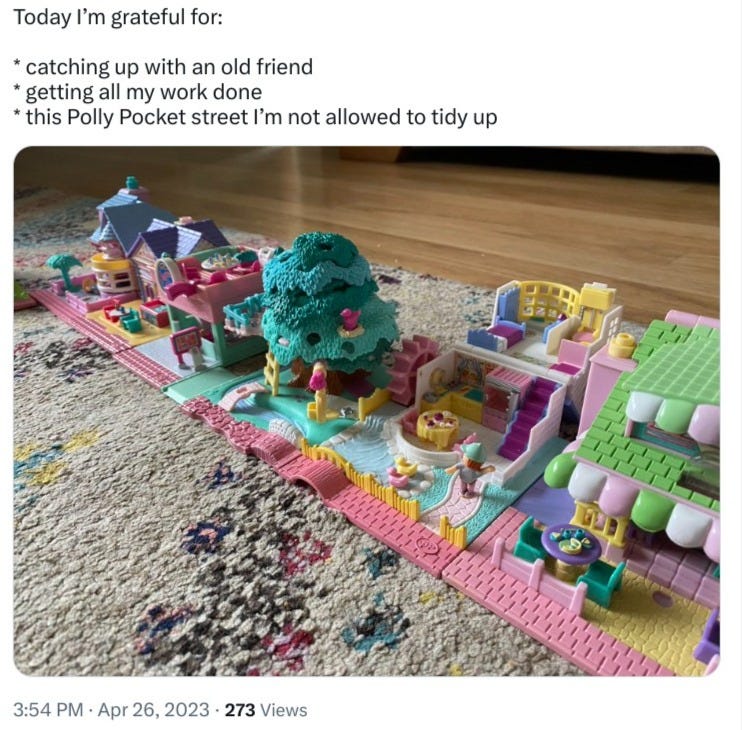
I won't do anything with it because a) it's not really grabbing me and b) I have too much else going on. But it exists now. The setting exists because of a tiny little Polly Pocket town my parents bought me when I was a kid. The characters get their personalities from me and people I knew growing up. They get the complexity of their relationships from toxic friendships I had as a teenager, from experiencing first hand that weird push-pull, love-hate thing that girls sometimes have with each other. The descriptions come from late-night conversations on camping trips and long walks with my husband. Layers and layers of little references to my own life in a few pages.
I think this might be why the idea of AI-written novels feels kind of soulless. These stories - no matter how sophisticated technology will become - won't have one writer's worldview and experiences soaked into every page. Instead, they will be a meaningless amalgamation of a million other people's lives. These aren't real stories: they're pieces of everyone else's. And, hearteningly, it seems that most readers genuinely don't want that.
I don't know what to do about my writing going forward. Do I keep sharing it for free, knowing it's feeding the same AI that could enable other people to make money with no effort? What am I doing this for, exactly? I don't know anymore. The whole point about writing, for me, is that other people get to see it and connect with it in some way, and I really don't want to stop doing that. I'm hoping that some kind of copyright situation will come to fruition; in the meantime, I guess I'll just keep plugging on and hope that everything works out.
Some writers act all hoity-toity about the sacred act of writing. As though we are chosen ones, anointed by the gods of creativity, given a special gift that nobody else has. Like a kind of magic. I personally believe this is bollocks. I think it’s mysterious and interesting, but not supernatural. It's just the brain. Hours and hours and hours (literally, countless hours) reading and writing and pouring my heart and soul into something I deeply care about. This is why I can write in a somewhat competent way. Because I keep working at it.
There are moments in my life where I feel truly alive. For a second, I can forget my worries and the fact that I have bills to pay and that my back hurts or whatever. These moments are pretty relatable to all humans, I think. But I feel like that sometimes when I'm writing fiction, too. The whole world disappears. Characters come alive in my mind, and somehow, through the act of typing, a story emerges from the depths of my brain. I can't stop being excited about this, no matter how often I do it.
It's not magic, but it kind of feels that way in the moment. I feel sad for people who don't experience it (I really mean that, even though that sounds kind of condescending). It is a total joy to use your mind like this. I'm addicted to it, probably. And as long as I can, I'm going to keep doing it. AI can't take that joy from me, and it can't take it from you, either.
Stay calm. Keep raising your voices. Don't let the tech bros pull the wool over your eyes about what's really going on. And if you’re one of the people I’ve seen on Twitter this weekend feeling so disillusioned that you want to give up: don’t. Keep writing. The fact that you're sitting there putting one word in front of the other genuinely means something, and the writing you produce will have a million times more heart and soul than anything generated by a machine.



